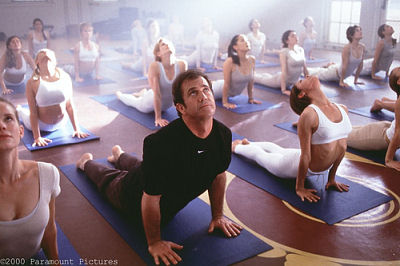




|
9 out of 10 |
 |
|
With a backdrop of a company
belatedly struggling to address women`s issues, the phrase "Life imitating art" springs to mind: with clearly no expense spared, one has the impression that it is not the fictional "Sloane Curtis", but Paramount Pictures itself that has something to prove in what is, at heart, a super-expensive "chick flick". Not only has the depth of style been painstakingly woven into even the smallest aspect of the script, but the cast consists almost entirely of Oscar winners: Alan Alda, Mel Gibson, Helen Hunt, Marisa Tomei....indeed, poor Ashley Johnston must feel pretty lonely holding the only major part in the film without a golden statuette to her name.
Indeed, it is understood that Mel Gibson
was extremely reluctant to appear, in what is a drastic departure from his normal "Brit-bashing" action flicks like "Braveheart" and the oxy-moronically named, "The Patriot". Yet appear he does in the lead role as Nick Marshall, a swaggering womaniser, suddenly plunged into a series of midlife crises. Not only does he loose his much mooted promotion to his dream job of Artistic Director at Ad Agency, Sloane Curtis to a woman, Darcy McGill (Helen Hunt), but his ex-wife`s departure on her honeymoon with her new beau, leaves him "babysitting" their 15year old daughter, Alexandra for a couple of weeks. Tough enough? Well the gravity of his dilemmas becomes a thousand-fold worse when a freak accident bestowes the unwanted gift of hearing the deepest thoughts of EVERY woman within ten feet of him - a gift that he has no power to control, leaving him deafened in an unbearable caccoffany as a group of women joggers trot by.
As time passes,
we observe him going through the various, clearly defined, psychological stages. At first, he denies it, then he fears it and consults his psychiatrist, played incidentally by Bette Middler, who turns in easily her best ever performance, despite being on screen for so little time. Next he realises its power and sets about undermining his hated boss, Darcy McGill by suggesting her own ideas before she has a chance to do so, by simply reading her mind and racing off to his boss. In particular, it is particularly amusing to watch his two stupid secretaries, who are so brain dead, that he can still only hear silence when he can hear ever other woman`s thought! Finally, gaining an outstanding understand women`s problems, he grows to empathise with them and becomes everyone`s personal agony aunt. He can`t help but cry in sympathy during Opera-style shows, he is hit by the pain of his own daughter`s adolescence and worst of all he realises that his past actions have brought a minor clerk to the brink of suicide who he has to race to save.
In many ways, the pattern
is similar to that of "Groundhog Day" where the central character only escapes from the curse of God-like powers through redemption of his soul, but unlike other flicks, no expense has been spared to create an overwhelming style and a metropolitan air, with Chicago as a backdrop and Mel Gibson performing a beautifully choreographed and touching dance with a hat stand to the music of Frank Sinatra. Indeed, Marisa Tomei`s character, Lola, who becomes briefly his girlfriend, has a role that is almost totally superfluous and one almost has the feeling that she was wheeled into the plot on the basis that romances in the city ALWAYS have a "dainty coffee shop girl" as her character describes herself and that`s the role she always plays.
Alan Alda, who personally turned
"MASH" from being an anti-war B movie into major TV industry, underlines the political undertones as Marshal`s boss, yet curiously the advertising for the film itself shows only Gibson and Hunt in what looks like a stale "drug store paperback" romance, and much of it, particularly the end performs as such. Even so, it remains a superb piece of drama and comedy that should not be missed.
Film Critic: Robert L Thompsett |
|